- Home
- Linwood Barclay
Stone Rain
Stone Rain Read online
CONTENTS
TITLE PAGE
DEDICATION
EPIGRAPH
CHAPTER 1
CHAPTER 2
CHAPTER 3
CHAPTER 4
CHAPTER 5
CHAPTER 6
CHAPTER 7
CHAPTER 8
CHAPTER 9
CHAPTER 10
CHAPTER 11
CHAPTER 12
CHAPTER 13
CHAPTER 14
CHAPTER 15
CHAPTER 16
CHAPTER 17
CHAPTER 18
CHAPTER 19
CHAPTER 20
CHAPTER 21
CHAPTER 22
CHAPTER 23
CHAPTER 24
CHAPTER 25
CHAPTER 26
CHAPTER 27
CHAPTER 28
CHAPTER 29
CHAPTER 30
CHAPTER 31
CHAPTER 32
CHAPTER 33
CHAPTER 34
CHAPTER 35
CHAPTER 36
CHAPTER 37
CHAPTER 38
CHAPTER 39
CHAPTER 40
CHAPTER 41
CHAPTER 42
ACKNOWLEDGMENTS
ABOUT THE AUTHOR
NO TIME FOR GOODBYE
PREVIEW FOR NO TIME FOR GOODBYE
ALSO BY LINWOOD BARCLAY
COPYRIGHT
For Neetha
Miranda heard noises coming from the bottom of the stairs. They were back. If they find me here, she thought, I’ll end up dead, just like the others.
It had to be them, downstairs in the bar. It was after hours, after all. Everyone else had cleared out. The Kickstart had been closed, the girls had been sent home. They’d be coming upstairs any moment now to finish up their business. It would be quite the day for them. Sell some beer, some drugs on the side, get a bunch of guys laid, figure out what to do with three bodies.
Oh yeah, they’d kill her. Well, maybe not Leo. Chances were he wouldn’t kill her. Gary would be the one to actually kill her. But Leo, he wouldn’t do anything to stop it. He always let Gary take the lead in these things. I’ll end up as dead as the others, Miranda thought.
If I don’t get out of here right now.
The others hadn’t been dead long.
Only minutes, she guessed, although it seemed much longer. It was true what they said, Miranda thought, about things slowing down. Maybe that’s why, in the movies, when something terribly dramatic was happening, they ran it in slow motion. Not just because it was a neat effect, but because it was a reflection of human experience. Maybe your brain had to play tricks with time, give you a chance to absorb what the hell was happening so you could figure out how to deal with it.
Miranda felt as though she’d been in this room with the three dead men for some time now. But maybe it hadn’t even been minutes. Maybe it had only been a few seconds. She wasn’t sure. She wondered whether she might be slipping into shock.
All she knew for certain was that they were dead. All you had to do was look at them. Sprawled out across the floor, not stirring, their shirts and pants soaked with blood.
Payne, dead. Eldridge, dead. Zane, dead.
And only moments before, all alive.
Eldridge had been the last to die. He’d hung on long enough to look into her eyes and say, “Gary…He’ll kill you…”
She hardly needed the warning.
Even as she’d heard Gary and Leo at the bottom of the stairs, she’d tried to pull herself together, to think. Focus, she thought. Focus.
For a moment, she wondered whether she could talk her way out of it. Tell Gary he didn’t have to worry about her, let her walk and she’d never breathe a word of the things he’d done, not even that he’d killed the only man she’d ever really loved.
Yeah, right. That was a plan.
She poked her head out the door and into the dingy hallway. To the left, the stairs. The smell of stale beer, human sweat, and cigarettes wafted up. To the right, at the end of the hallway, a window that opened onto the fire escape.
Miranda grabbed her bag and ran for the window, pushed up on it. It didn’t want to budge.
The voices were getting closer. Maybe halfway up. She could hear their footsteps. She pushed harder on the stuck window, and it rose an inch, just enough for her to slip her fingers under it. She put everything she had into lifting it, opened it wide enough to get one leg out and planted on the rusted metal grating. Then she swung her body through, her other leg.
She caught a glimpse of them entering the far end of the hallway as she pressed herself against the building’s cold brick wall. And then, as if willing herself to be weightless, she descended the metal stairs without a sound, and when she reached the bottom, ran off into the night.
She knew she’d have to get away and never come back. She couldn’t go to the police. They wouldn’t help, wouldn’t guarantee her safety. Gary always found a way.
She was on her own. She’d have to disappear. She’d have to make it so no one ever found her.
Because she knew he’d be looking. And she knew he’d never give up.
1
“YOU HAVE TO EMPTY all the change out of your pockets,” the uniformed woman told me. “And I need your wallet.”
For a second, I thought about making a joke. Maybe, under less stressful circumstances, I might have. A visit to a prison under normal conditions—does anyone visit a prison under normal conditions?—would have been stressful enough. But my reasons for being here were far from normal. And there wasn’t anything normal about the guy sitting in the pickup truck, out in the prison parking lot, waiting for me to do what I’d come here to do.
If I’d just been here doing a story for the Metropolitan, when the female guard asked for my wallet I might have said, What is this, a stickup? They don’t pay you enough? And then I would have laughed. Ha-ha.
But there was nothing to suggest that this woman, black, mid-forties, built like a safe, wearing a shiny black belt with a riot stick attached, was feeling all that jocular herself. Maybe working in a prison does that to you. You didn’t have to be an inmate to feel the oppressiveness of the place.
I’d already put my cell phone in the plastic tray she’d given me. “Okay, I can see how change would set off this thing,” I said, nodding at the security portal, like those ones they have at the airport, that I’d have to walk through to get any further into the prison. “But why do I have to give you my wallet?”
“You can’t take any money into the prison,” the woman said sternly. “You’re not allowed to give money to the inmates.” For just a moment, her hand rested on her riot stick. Honestly, I think it was an unconscious gesture, not intended to send a message, but I got one just the same. Don’t give me a hard time. That was the message I got.
I am not a big fan of getting whacked in the head with a riot stick. But at that moment, honestly, it’s hard to imagine how it could have made things any worse than they already were.
I’d never been in a prison before, let alone a women’s prison, and I’d only been at this one for about five minutes, and already I was pretty certain it was not a nice place to be. I got that impression as I approached the main entrance. I walked up to a ten-foot chain-link fence looped at the top with barbed wire, and pressed a button on a small speaker mounted next to the gate.
“Hello?”
A voice, no doubt coming from the building fifty feet beyond the gate, crackled, “Name?”
“Uh, Walker?” Like I wasn’t really sure. “Zack Walker?”
Then, nothing. I stood by the gate a good ten seconds, wondering whether I wasn’t on the list even though I’d phoned the lawyer—he was supposed to have pulled some strings, called in favo
rs, name your cliché, to get me in here. But then there was a buzzing sound, which was my signal to push the gate wide. I glanced up at the surveillance cameras as I walked up to the main building, which, without the fencing and barbed wire, might have passed for a community college. Once inside, I approached the counter, where I encountered the humorless guard with the riot stick.
“So,” I said, trying to make conversation and forget how grave the situation was while I fumbled around for my wallet, seemingly forgetting that it was in my right back pocket, where it has been since I was fifteen, “is this where Martha Stewart did her time?”
Nothing.
Wallet out, I glanced into it, counted seven dollars, before dropping it into the tray with my cell phone. Seven dollars. Then, from the front pockets of my jeans, I dug out fifty-seven cents. How much would $7.57 buy in prison? How many smokes? Wasn’t that what everyone wanted money for in prison? Smokes?
The guard slapped a short, stubby key with a square of orange plastic at the end onto the counter, then pointed to a bank of airport-type lockers against the far wall. “You can put your stuff in there,” she said. I took my tray of belongings, found the locker that matched the number on the key, and stowed it. I had to print my name in a book, then sign next to it, put down the time of my arrival. They ran a wand over me after I stepped through the security door, making sure I wasn’t sneaking in with any weapons.
If only I had a weapon. I wouldn’t have to be here now.
Once inside I was directed to a room full of carrels, like you might find in a university library, where students could do their work in private. But this carrel faced onto another one, the two separated by a sheet of glass. Each side had a phone, or at least the handset. No keypad. You didn’t dial out for pizza from here.
Just like in the movies.
Another guard, also a woman, said something behind me. “Everything okay here?” I must have jumped. “Just chill,” she said, smiling. Then she looked beyond me. “Hey, you’re set to go.”
I nodded, swallowed, turned back to look at the glass, and there she was, coming through the door of the room I was looking into. My friend Trixie Snelling.
Another female guard directed her to the chair on the other side of the piece of glass. She sat down, and I got my first look at her since her arrest.
I must have been expecting to see her in an orange prison jumpsuit or something, because I did a bit of a double take when she showed up in jeans (minus the belt), a pullover Gap shirt, and sneakers. Trixie, with her jet black hair, dark eyes, and trim figure, could turn heads no matter what she wore. She certainly had no trouble holding someone’s attention when, whip in hand, she donned her leather corset and boots, but that was when she was on the clock. Outside of work, even in a pair of sweats, there was no getting around the fact that she was a beautiful and alluring woman.
But I could see that a couple of days in jail had already taken a toll on her. She was without her usual makeup and her eyes were tired, her dark hair less full. I guessed she’d been managing on a lot less sleep than usual.
No surprise there.
Trixie had been a friend—and just a friend—for a few years now. We’d lived a couple of doors down from her when we still had our house in suburban Oakwood. I was working from home back then, and Trixie was operating a home-based business as well. I was naive enough, at first, to think it was accounting. I was not, at the time, a person who was very good at picking up the signals, and there were plenty of them—think of immense, flashing billboards—to indicate that Trixie was not making a living doing people’s tax returns.
We’d already established a friendship when I learned the true nature of Trixie’s business, and for reasons I can’t totally explain, we remained friends. I’m not exactly the kind of person who befriends people who live on the edge of the law.
It’s not that I think I’m better than them. It’s just that I’m the kind of guy who panics if he hasn’t paid his parking ticket on time. Or I would be, if I weren’t the kind of person who runs back to the meter five minutes ahead of time to plug in a few more nickels.
Trixie tried to smile as she reached for the phone, but she had to know that this was more than a social visit. There had been some frantic calls in the last hour to allow this face-to-face meeting.
“Zack, Jesus, what are you doing here?”
“Hi, Trixie,” I said.
“I get this message, my lawyer’s setting up a meeting with you, very urgent. What’s going on?”
Her lawyer wouldn’t have been able to tell her. I hadn’t been able to tell him. I’d had to convince him that he had to let me see his client without revealing why. If Trixie wanted to tell him what I’d had to say, afterwards, that was her call.
It couldn’t be mine.
“I have some things to tell you,” I said, “but I need you to remain cool when I do.”
“What?”
“Are you listening? You have to stay calm and listen to what I have to say.”
Her eyes were darting nervously about. No matter how bad she might think what I was going to tell her was, it was going to be worse.
“Okay,” she said. “What is it?”
“It’s bad,” I said, lowering my voice as I spoke into the receiver. “They’ve got her.”
The look in Trixie’s eyes told me there was no need to be more specific. She knew exactly who I was talking about.
Of course, I’m getting a bit ahead of myself here. There were a whole lot of things that led up to this point.
And a whole lot that happened after.
Maybe I should back up a bit.
2
“I NEED TWENTY BUCKS,” said Paul, our seventeen-year-old.
Sarah and I were at the kitchen table, the dirty dinner dishes cleared but still sitting next to the sink, waiting to be dealt with. We had poured ourselves some wine. Sarah had brought home a bottle of Beringer and we had filled our glasses to the top when our son popped his head in.
“What for?” Sarah asked after a large slurp of white zinfandel.
“Just stuff,” Paul said. “We might go to the movies or something.”
“A movie isn’t twenty bucks,” I said. “Yet.”
Paul sighed. “Popcorn? You want me to watch a movie without popcorn?”
I looked at Sarah. She said, “I wouldn’t be able to sleep if that happened.”
I said, “Didn’t I give you twenty bucks a couple of days ago?”
Another sigh. “It was three days ago.”
“Okay,” I said. “So it was three days ago. Where did that twenty dollars go?”
“Screw it, never mind,” Paul said, and withdrew.
“Hang on a second, pal,” I said, and was starting to get up from my chair when Sarah reached over and grabbed my arm.
“Sit down,” she said. “Let him go.” I settled back into the chair. “Have some more wine.” She topped up my glass. “He’s just being a D.H.” Parental shorthand for dickhead.
“No kidding,” I said. Paul’s in his last year of high school, and he’s a pretty good kid, all things considered. But sometimes, I just wanted to ground him for a month or two, only at someone else’s house.
I sipped my wine.
“Not like that,” Sarah said. “You’re drinking like a girl. Here, watch me.” She tipped back her nearly full glass, polished it off in four swallows. She put the glass back down, said, “Hit me.”
I filled it.
“We need to do this more often,” Sarah said. “It’s been kind of stressful around here lately, in case you hadn’t noticed.”
No kidding. I’d been home only a couple of days, having returned from my father’s fishing camp, where, not to understate it or anything, all hell had broken loose. It was the third time in as many years that I’d found myself in a pickle—now there’s a word for it—for which I had no training, and where I was in way over my head.
I had promised Sarah, and myself, that no more would I allow myself to get
sucked into dangerous situations, not that I had wanted it to happen those other times. I wasn’t cut out for it. I was, and am, a writer of so-so science fiction novels, paying the bills writing features for the Metropolitan newspaper, where Sarah is, depending on the day, my editor. At a large daily newspaper, you can get chewed out by so many people higher up the food chain than yourself that it’s hard to narrow down the bosses to whom you report to just one person.
“Yeah,” I said, “very stressful. But he doesn’t make it any easier, acting like that. And I swear, he’s hitting me up for ten, twenty bucks every day, it seems. And it’s just entertainment. Renting movies, seeing movies, buying video games. I don’t spend what he does on enter—”
“Drink,” Sarah said.
I obeyed. “Do we have another bottle of this stuff?” I asked. Sarah nodded. “Where’s Angie tonight?”
Angie was in her second year at Mackenzie University, but since the school was in the city, and we lived in that city, she was not in residence.
“Class,” Sarah said. “Evening lecture or something.”
“I hardly ever see her around here. Sometimes I don’t even think she comes home every night.”
“She has a boyfriend,” Sarah said. The comment hung in the air for a while, which gave me time to consider its implications. “And she’s nearly twenty,” Sarah said. “If she boarded at university, if she’d gone clear across the country somewhere, you’d never know when she came home and when she didn’t.”
I finished off my glass, got up, and went to the fridge. “Where’s the other bottle?”
“It’s in there, just look,” Sarah said. “Did I tell you about the foreign editor thing?”
“What foreign editor thing?”
“They posted it. They need a new foreign editor. Garth’s going to the editorial board, where he can write ‘on the one hand this, on the other hand that.’”
“Are you sure there’s another bottle?”
“Do I have to come over there myself and embarrass you?”
“Look, I’m either going blind or there’s no wine in here at—hang on, here it is. Okay, so, you want that job?”
“It’s a step up from features editor. More staff, bigger stories, a larger budget to watch over.”

 Chase
Chase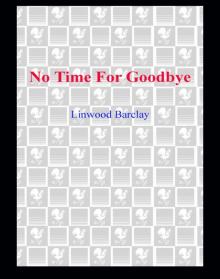 No Time for Goodbye
No Time for Goodbye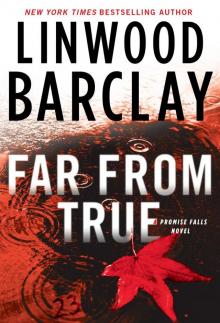 Far From True
Far From True Lone Wolf
Lone Wolf Fear the Worst
Fear the Worst Broken Promise
Broken Promise A Tap on the Window
A Tap on the Window Parting Shot
Parting Shot Bad News
Bad News Too Close to Home
Too Close to Home Final Assignment
Final Assignment No Safe House
No Safe House A Noise Downstairs
A Noise Downstairs Bad Guys
Bad Guys The Accident
The Accident Stone Rain
Stone Rain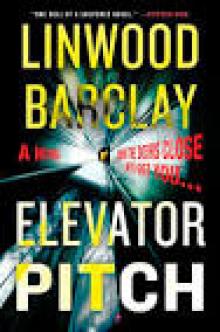 Elevator Pitch
Elevator Pitch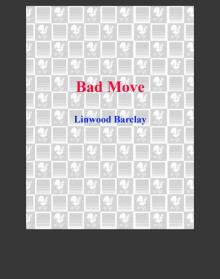 Bad Move
Bad Move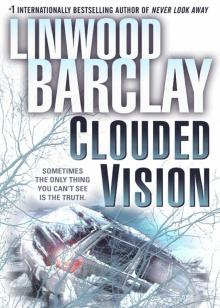 Clouded Vision
Clouded Vision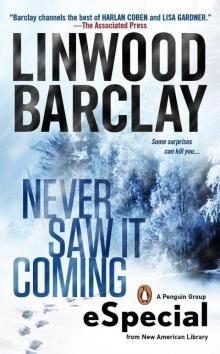 Never Saw It Coming
Never Saw It Coming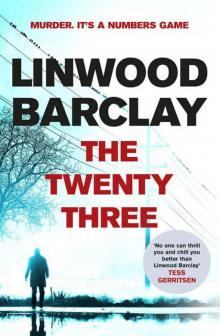 The Twenty-Three
The Twenty-Three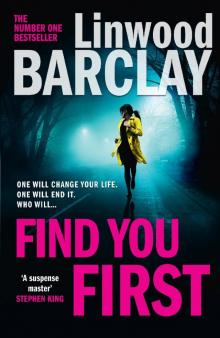 Find You First
Find You First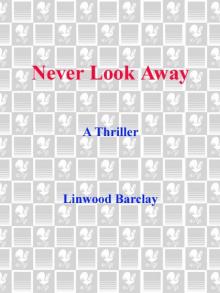 Never Look Away
Never Look Away Elevator Pitch (UK)
Elevator Pitch (UK)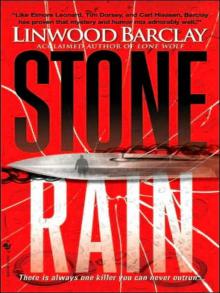 Stone Rain zw-4
Stone Rain zw-4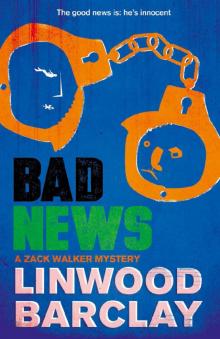 Bad News: A Zack Walker Mystery #4
Bad News: A Zack Walker Mystery #4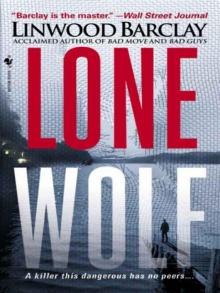 Lone Wolf zw-3
Lone Wolf zw-3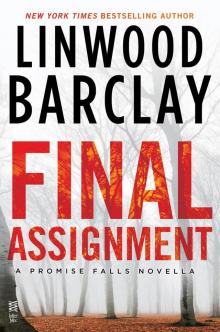 Final Assignment: A Promise Falls Novella
Final Assignment: A Promise Falls Novella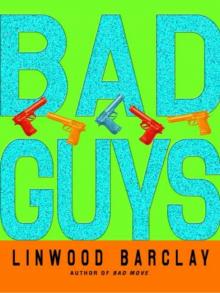 Bad Guys zw-2
Bad Guys zw-2 Never Saw It Coming: (An eSpecial from New American Library)
Never Saw It Coming: (An eSpecial from New American Library)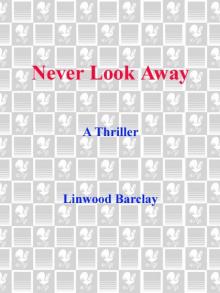 Never Look Away: A Thriller
Never Look Away: A Thriller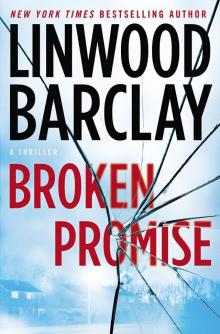 Broken Promise: A Thriller
Broken Promise: A Thriller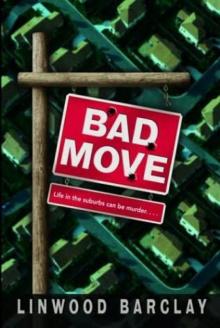 Bad Move zw-1
Bad Move zw-1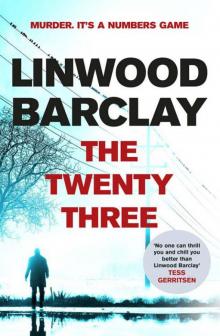 The Twenty-Three 3 (Promise Falls)
The Twenty-Three 3 (Promise Falls)